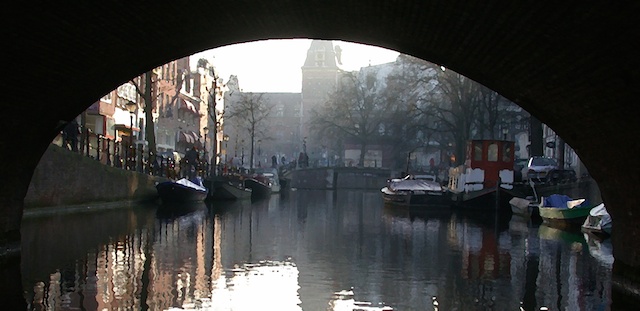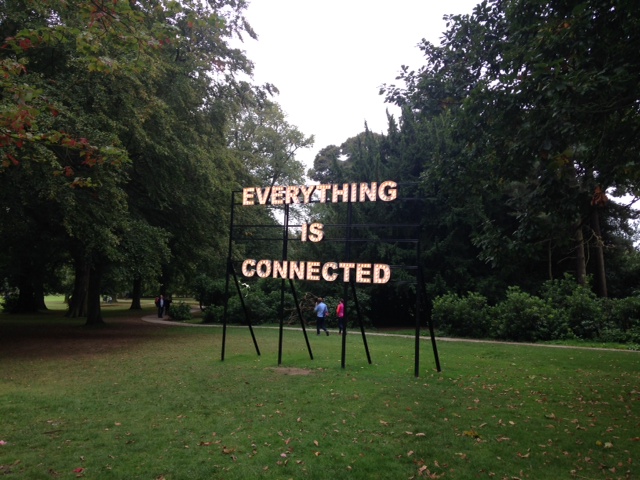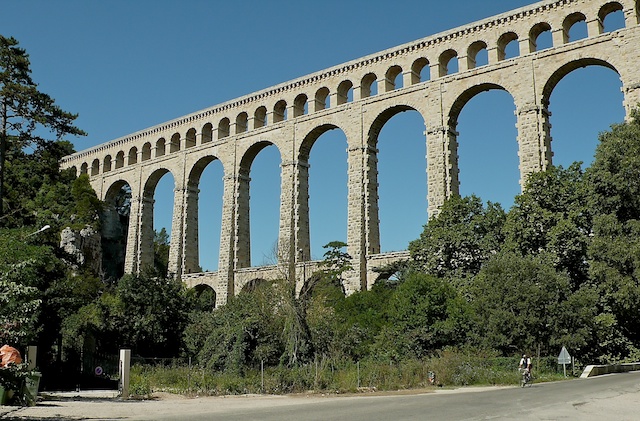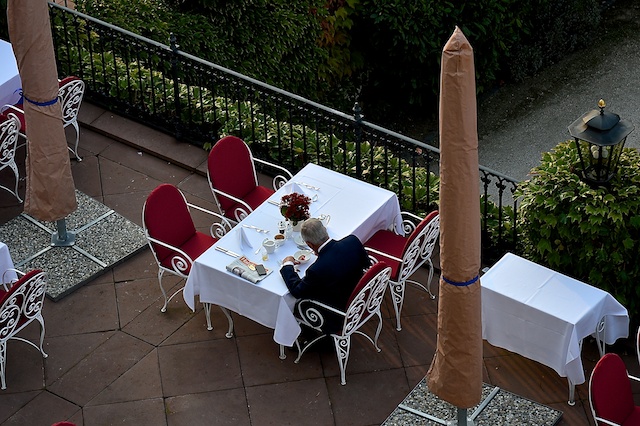Just came on this photoshopped version of a photograph I took in 2003 from a boat on an Amsterdam canal. The building in the background is the Rijksmuseum. Corny but nice.
Everything is connected…
Quote of the Day
We are stuck with technology when what we really want is just stuff that works.
Douglas Adams, The Salmon of Doubt
Apple Pay’s revenue stream
Further to my Observer column yesterday, this from Bloomberg.
Apple Inc. (AAPL) will reap fees from banks when consumers use an iPhone in place of credit and debit cards for purchases, a deal that gives the handset maker a cut of the growing market for mobile payments, according to three people with knowledge of the arrangement.
That’s a small cut on millions of daily transactions. Adds up to a formidable revenue stream.
Quote of the Day
You know what a learning experience is? A learning experience is one of those things that says, “You know that thing you just did? Don’t do that.”
Douglas Adams in The Salmon of Doubt
Why Apple Pay was the big news from Apple
This morning’s Observer column
In the long view of history, though, the innovation that may be seen as really significant is Apple Pay – an ingenious blend of contactless payment technology with security features that are baked into the new iPhones. Apple Pay will, burbled Tim Cook, “forever change the way all of us buy things… it’s what makes the iPhone 6 the biggest advancement in the history of iPhones”.
The idea is to do away with the rigmarole of having to pull out a credit/debit card, insert in a store’s card reader, type a pin, etc. Instead, you simply bump your iPhone (and, eventually, your Apple Watch) against the store’s contactless reader and – bingo! – you’ve paid, and the store never gets to see your card. Why? Because Apple has stored the card details in heavily encrypted form on your device and assigned each card a unique, device-specific number, which is accepted by the retailer’s contactless reader.
This only works, of course, if the retailer has already signed up with Apple. Cook claimed that 220,000 US retailers have already opted in to the system, as well as six major banks, plus MasterCard, Visa and American Express – which means that 83% of all US credit card payment volume can theoretically already be handled by Apple Pay.
If true, this is a really big deal, because it puts Apple at the heart of an unimaginable volume of financial transactions. In a way, the company is now doing to the card payment business what it did to the music business with the iTunes store…
How to bring water to Aix-en-Provence
Breakfast in style
So who still believes that collecting metadata is harmless?
Interesting snippet in the latest newsletter from the Open Rights Group:
It was revealed last week that the Met police accessed the telephone records of The Sun’s Political Editor, Tom Newton Dunn, using a RIPA request.
The case should end any discussion about whether or not metadata reveals anything personal about us: Newton Dunn’s calls and when and where they were received, were seen as enough to identify a whistleblower, who contacted him over the Plebgate scandal.
Journalistic privilege, protected by the Police and Criminal Evidence Act, was circumvented by the use of RIPA. Newton Dunn was not even aware that his records had been accessed until the Met published their report into the Plebgate affair.
When DRIP was announced, Newton Dunn wrote in The Sun, that the new powers would give MI5 and cops, “crucial access to plotters’ mobile phone records”. UK public authorities use RIPA over 500,000 a year to access private data. The police refused to answer questions as to how many times they have have accessed journalists’ data. When this is happening without our knowledge, we cannot ignore the threat to our civil liberties that data retention poses.
The interesting bit is the fact that the metadata were sufficient to identify a whistleblower. We all knew that, of course, but the official line is still that bulk collection of metadata does not infringe on privacy.
Obama’s speech on ISIS, translated
Lovely piece by David Frum in The Atlantic.
We don’t really have a plan. We don’t have a definition of success. We see some evildoers and we’re going to whack them. They deserve it, don’t they?
And sure, ISIS does deserve it. The group is a nasty collection of slavers, rapists, thieves, throat-slitters, and all-around psychopaths. The trouble is: so are the people fighting ISIS, the regimes in Tehran and Damascus that will reap the benefits of the war the president just announced. They may be less irrational and unpredictable than ISIS. But if anything, America’s new unspoken allies in the anti-ISIS war actually represent a greater “challenge to international order” and a more significant “threat to America’s core interests” than the vicious characters the United States will soon drop bombs on.
The question before the nation is, “What is the benefit of this war to America and to Americans?”
Which is a purely rhetorical question, left unanswered.




